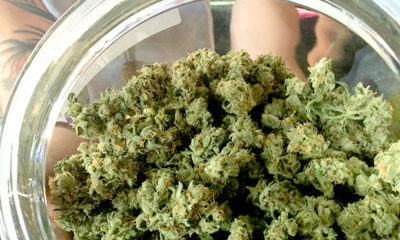
Medical
Fake Marijuana Keeps Killing People All Over the U.S.
The latest death linked to synthetic marijuana demonstrates a real drug scourge facing the United States.
On Aug. 1, authorities in Wisconsin recorded what they say is the first instance in their state of a fatality linked to synthetic marijuana.
More than a dozen people, including military personnel, have died in 2018 after ingesting synthetic marijuana — a blanket term used to describe plant material sprayed with a varying concoction of chemicals, whose effects are intended to mimic those of cannabinoids on the brain and body, but are often cut with toxic materials including rat poison.
And in a demonstration of painfully obvious irony that should surprise no one and outrage everyone, most deaths have occurred in areas where regular cannabis — which has killed nobody — is illegal, and where authorities have not been able to stop the sales of synthetic marijuana.
Earlier in the summer, the Wisconsin Attorney General’s Office said that two deaths could be attributed to smoking synthetic marijuana.
On August 1, authorities announced that at least one of the deaths, a 33-year-old woman who collapsed and died in July, was due to fake marijuana.
According to Wisconsin Poison Control, the woman used a batch of synthetic marijuana sold under the name “K2” that was contaminated with rat poison.
Synthetic marijuana has been linked to dozens of deaths and hundreds of hospital visits all around the country this year alone.
Brad Schimel, Wisconsin’s attorney general, issued a desperate plea to retailers to “stop selling these dangerous synthetic cannabinoids and pull them off your shelves immediately.”
It bears mentioning that Schimel has criticized plans to legalize marijuana in Wisconsin, which lags far behind in access to legal cannabis in comparison to neighboring states including Illinois and Minnesota.
In a span of about a week in Washington D.C. earlier this summer, authorities attributed four deaths and 140 “people sickened” to a “bad batch” of K2.
Victims of synthetic marijuana that did not die were left in “zombie-like” catatonic states. Other batches of fake cannabis in other cities including New York have led to similar scenes.
RIGHT NOW: It’s like a scene out of the walking dead. A block from the @DCPoliceDept station, several people are dropping like flies all day from what’s being called by first responders, “bad K2”. https://t.co/yc5r3SuMaz @LindsayAWatts pic.twitter.com/pJbiQwKoyk
— Van Applegate (@vbagate) July 19, 2018
In Chicago, health authorities say at least five people have been killed by synthetic marijuana, including a 25-year-old man whose death June 12 was linked to a rat poison that is “commonly used to make synthetic marijuana.”
And in January, more than 93 U.S. Army soldiers and U.S. Marines in two states became sick after vaping what Pentagon authorities described as “synthetic cannabinoid oil.” At least two service members died after suffering seizures, according to CBS News.
Like many others who use synthetic marijuana, the soldiers were seeking a “high” that would not later appear on a drug test. Cannabis use is banned in the military, with violators facing penalties up to and including expulsion from the service, and loss of attendant benefits.
In other states — including Wisconsin — lawmakers and other elected officials have expressed interest in requiring recipients of food stamps and other benefits to submit to drug testing. Those who fail drug tests could see their government benefits reduced to cut entirely.
In this way, the government continues to create a strong incentive for people to use synthetic marijuana despite the risks. That, in turn, creates a market incentive for gas stations, smoke shops and other unscrupulous merchants to sell the potentially deadly stuff.
Both law enforcement and public-health authorities agree that synthetic cannabis is a menace to public health. And this potentially deadly situation has arisen thanks to marijuana prohibition.
Thus, the solution is painfully obvious. Whether authorities will admit to themselves what it is — and whether more people have to die before they do — remains to be seen.
TELL US, do you think synthetic marijuana sales should be banned?























